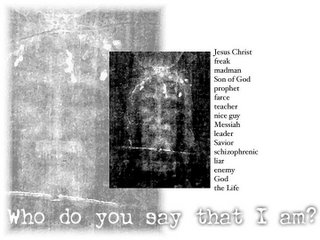 With 2006's swift approach I've been thinking about amends.
With 2006's swift approach I've been thinking about amends.Have you ever been unwilling to make amends because the cost seemed too real or too precious? I know I have. Most of the time I've found it easier to over-estimate the cost of making amends and underestimate the cost of allowing unforgiveness, bitterness or other unhealthy emotions to live rent-free in my heart, in my mind, in my life.
Proving once again that math is more "rational" than "emotional" and that when rooted in emotion instead of truth, "estimates about the cost/benefit ratio of doing the right thing” are more often "off" than "on".
Making amends is probably the closest most of us will ever be to being a medical doctor ("I'm not a doctor, but I play one on TV ... and in my own life!") Using our senses, our intellect, our experiences, and our hearts to "make a diagnosis" isn't "risky," enough to avoid doing it … despite what psychoanalysts say.
We are not helpless children, wandering through life – constantly looking for a hand to hold onto. We are adults. Not invincible, but strong and true, and in many ways wanting the best for ourselves.
Yes we all struggle with sin, but despite this bent to try and live life on our own, our search for wholeness and redemption isn’t always rooted in selfishness. And it’s in our moments of clarity, where our longings to “set things right” trumps our desire to “get our own way” that we can choose to turn our sails into the wind of God, so our ships can chart new courses of purpose and vision.
So let's not be afraid to diagnose our own conditions and then take the medicine we need, that we want. For it is in swallowing our pride and then this soul-prescription of making amends where healing begins.
Walking through difficult chapters of life brings us a certain kind of medicine we cannot find on any other road. In fact, much of the medicine we have the opportunity to digest during tough chapters (ie., hearty doses of compassion, honesty, determination, loyalty and trust) are what will later (usually just when we most need it) bring forth the discernment and courage we need to live into the amends needed.
During thorny circumstances it’s as though God softens our hearts, and stiffens our resolve to be different kinds of people. And without the episodes of pain and struggle, we seldom have the insight needed to stay on the God-path with passion, character and freedom.
I mean, damn, even a blind man can stay on the path if he has the right cane. But we need more than a cane. If we’re to begin trusting our leadings, become people of amends, and proceed through life without fear, we need a new pair of eyes.
God, give me a new pair of eyes. Eyes to see myself, others and You with the clarity I need. Give me a heart to be a repairer of bridges burned, a reblazer of relationship-paths that have been too-long neglected, and a restorer of the belief (in my own life and in others) of the reality that You care about the day-to-day stuff of my life – and that the closer I remain to You, the less of a mess my life will be.
God, help me to live life with fewer regrets by becoming who doesn’t fear making amends. Godspeed.
read.think.pray.live.
Gregg

